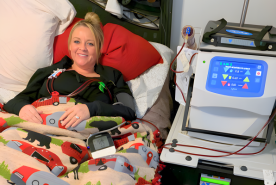For many people with kidney failure, dialysis helps them live longer and improves their quality of life. But for some people, the improvement they feel may be a lot more limited— often because of their serious health problems. It is important to know that in such a situation, you have the right to decide not to start dialysis. Before making a decision, however, you should discuss your thoughts carefully with people you trust and seek advice from your doctor or other healthcare provider, family member(s), your lawyer or others who have your best interests at heart. This booklet has been written to answer some general questions you may have about the choice not to start dialysis.
Can I really decide not to start dialysis treatment?
Yes. You have the right to decide not to start dialysis if you feel that the burdens outweigh the benefits to you. If you are not able to make this kind of decision, someone (such as a family member, lawyer, etc.) can make this decision on your behalf. The person you name to make such decisions is called your surrogate.
How do I go about naming someone to be my surrogate?
A surrogate is someone you choose to make decisions for you if you are not able to make them yourself. Naming a surrogate is done by filling out a form known as an advance directive, a healthcare proxy, or a durable healthcare power of attorney. It is important to make sure the person you name is willing to act on your behalf. It is also very important that you tell the person about your wishes and values so that he or she can make the decisions you would make if you were not able to speak for yourself. It will be helpful to your surrogate if you give clear directions on your advance directive form about dialysis and/or other medical treatments you would want or not want.
The role and responsibilities of the surrogate, as well as the types of decisions the surrogate may make, vary from state to state, depending on the laws of each state. Generally, the surrogate must follow your wishes. For more information about naming a surrogate and about the laws in your state, you may want to speak with an attorney or your local or state bar association. You may also obtain copies of the forms online or by calling the the National Hospice and Palliative Care Organization at 800.646.6460.
Will my doctor help me decide whether to start treatment?
Yes. Your doctor will speak with you about what dialysis treatment involves and what deciding not to start dialysis would mean for you. While you try to make this decision, you may also want to get advice from people who provide emotional support to you and your loved ones and other trained professionals, such as your social worker. However, the final decision about starting or not starting treatment remains with you or your surrogate.
What if I’m not sure if dialysis could help me?
Sometimes it may not be clear whether the benefits of dialysis outweigh the burdens. Each person’s situation is different. If you are uncertain, you may be able to start treatment for a trial period—for example, one to three months. During and after the trial period, your doctor and the other members of your dialysis team will talk with you about how you are feeling and coping with the treatment routine. Ask as many questions as you need to help with your decision to continue or to stop treatment.
How do I discuss this decision with my family and friends?
Many people find it difficult to talk about whether or not to start treatment, and they worry about how others will feel and react. Although you may find it hard at first, the best approach is to discuss your feelings openly with your loved ones. Your family will most likely feel very emotional too, and may have questions. You may wish to include, other people in this discussion whose advice you value, such as your religious or spiritual advisor, social worker, doctor or other healthcare worker.
Will I be asked to speak to a mental health professional?
If your doctor is concerned that you may not want to start dialysis for an emotional reason, such as depression, he or she may ask you to speak with a psychiatrist, social worker or other counseling professional. Depression may be treated successfully with counseling, medicine or a combination of both. Your doctor may also want you to speak with a mental health professional to make sure you understand the full impact of choosing not to start dialysis.
How long will I live if I choose not to start dialysis?
There is no certain answer to this question. It varies, because everybody is different. Each person’s medical status is unique. People with kidney failure may survive days to weeks without dialysis, depending on the amount of kidney function they have, how severe their symptoms are, and their overall medical condition.
Is death from kidney failure painful?
Not usually. If you do feel any discomfort, pain medication may be prescribed for you. Without treatment for kidney failure, toxins, and fluid will build up in your body, making you feel increasingly tired, nauseous and itchy. These symptoms can be controlled with medication and other supportive measures to make you more comfortable and lessen your anxiety. The fluid build-up can make it more difficult for you to breathe. Your doctor can prescribe medication or a treatment called ultrafiltration to remove fluid and make breathing easier for you. Your doctor may also recommend that you limit your intake of salt and fluids to reduce fluid weight gain.
Is deciding not to start dialysis considered suicide?
Many religions believe people have the right to refuse medical treatment, including dialysis, if they feel it will not help them and will be burdensome. You may wish to speak with your religious or spiritual advisor if you have concerns about this.
What type of food and drink could I have?
Typically, there is no reason for you to continue to follow your kidney diet once you choose end-of-life care. In fact, favorite foods and beverages are usually encouraged. Your doctor, nurse, and dietitian can answer other specific questions you may have about food and fluid intake.
If I make this decision, will my doctor continue to help me?
Yes. Your doctor should be available to you and your family to discuss your concerns and advise you about the type of care you might need. Your doctor should work with members of your healthcare team to arrange the necessary referrals or consultations for your circumstances. Other professionals, such as the social worker or nurse who has been part of your healthcare team should also remain available to you.
Do I have a choice of where I die?
Your wishes about where you want to die will be honored as much as possible. Many people choose to die at home, where they feel more comfortable in familiar surroundings. If you choose this option, a hospice or home health agency may assist you and your loved ones in making any special arrangements for your care at home. A nursing home may be an option for some people. Admission to the hospital may not be a consideration, depending on your insurance coverage and overall medical condition.
Could I get hospice care?
If you choose not to start dialysis, you require end-of-life care and you are eligible for hospice services. The type of hospice care available may be either a home hospice program or a hospice facility. A social worker, a visiting nurse service or home care agency may be able to help you and your loved ones make arrangements for hospice care. Hospice services usually include some visits from a nurse, a home health aide, and a social worker.
For more information about hospice programs in your community, speak with your doctor, nurse, or social worker. You may also be able to get information from your religious community, or from friends and neighbors who have had experience with hospice care. If you are a senior citizen, you can contact a local senior center or the local or state Office on Aging. Also, check your local yellow pages and Internet resources such as www.hospicedirectory.org.
If I choose to die at home, can I get a home healthcare worker to help my family care for me?
The types of services covered at home will depend on your insurance. If you are in a home hospice program, a home health aide may be available to assist. If your insurance does not cover a home health aide, and you and your loved ones wish to pay privately for these services, you can do so. There may also be government programs to help with costs. Ask your doctor, social worker, and community or government agencies about available and affordable home services.
Will I still be covered by Medicare and/or my private medical insurance if I stop treatment?
Your Medicare coverage will not end, even if you decide to stop dialysis. It is important that you and your family speak with your doctor about the type of care you will need. Once this is decided, you can check on whether or not Medicare and/or private insurance will cover this care.
If I change my mind, can I go back on dialysis?
You may start or return to dialysis if you change your mind. If you have missed several treatments, you may have some discomfort when you first start dialysis again. You will require vascular access if you do not already have a working dialysis fistula. You should discuss the possibility of returning to dialysis with your doctor.
Is there anything else I should know about not starting dialysis?
If you decide not to start treatment, you or your surrogate may want to make sure the following items are in order:
- Signed “Advance Directives” documents that comply with your state law. “Advance Directives” refer to documenting your health and medical treatment wishes and designating a surrogate. You do not need a lawyer to complete advance directives. There are usually three types of advance directives:
- Living Will: This specifies what kind of medical treatment you want if you become unable to make decisions yourself—for example, the use of life-sustaining therapies or equipment like CPR (cardiopulmonary resuscitation) and ventilators, feeding and other treatments like pain medication.
- Healthcare Proxy: This specifies who you choose to make healthcare decisions for you if and when you become unable to make them yourself.
- Durable Healthcare Power of Attorney: This provides power of attorney to someone you choose to make decisions on your behalf on all matters other than medical (e.g., legal, financial, banking and business matters), if and when you become unable to make decisions yourself. This document allows the person you choose to make bank transactions, pay bills, and take care of other important matters, if and when you are not able to take care of them yourself.
- An inventory, including the location of your bank, brokerage and other financial accounts, stock and bond holdings, real estate and business records, medical and other insurance policies, pension plans and other legal papers.
- The names, addresses and telephone numbers of your attorney, accountant, family members and other loved ones, friends and business associates who should be notified of your death or who may have information that will be helpful in dealing with your estate.
- A statement about your preference for funeral/memorial services, burial or cremation instructions, and decisions about organ and tissue donation.
- A written, video- or audio-taped message to family members and other loved ones, business associates and friends, if you choose.
- If you provide care for loved ones, a plan for how their care will be provided for after your death.
Additional information about advance directives, living wills, healthcare proxies or durable healthcare powers of attorney may be obtained from your lawyer, if you have one, or your local or state bar association. These forms are downloadable online.
What if I have more questions?
If you have more questions about medical concerns, speak with your doctor, social worker, nurse or other people whose advice you trust.
Click here to download the PDF brochure.
If you would like more information, please contact us.
© 2015 National Kidney Foundation. All rights reserved. This material does not constitute medical advice. It is intended for informational purposes only. Please consult a physician for specific treatment recommendations.








